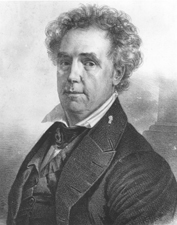Richard Mentor Johnson
|
|
Richard Mentor Johnson (October 17, 1780–November 19, 1850) was a Representative and a Senator from Kentucky and the ninth Vice President of the United States, serving in the administration of Martin Van Buren.
He was born at "Beargrass", Jefferson County, Kentucky, near the present site of Louisville, and attended Transylvania University. He was admitted to the bar in 1802, and was a member of the state House of Representatives from 1804-1806 and again in 1819. He was elected as a Democratic-Republican to the Tenth and to the five succeeding Congresses (March 4, 1807-March 3, 1819). He was chairman of the Committee on Claims and the Committee on Expenditures in the Department of War.
Johnson was commissioned a Colonel of Kentucky Volunteers and commanded a regiment in engagements against the British in Lower Canada in 1813. He was credited by some with personally killing the Shawnee leader Tecumseh during the Battle of the Thames; despite the doubtful accuracy of this claim, Johnson would later use it to good effect in his political career. He was elected to the United States Senate to fill the vacancy caused by the resignation of John J. Crittenden, and was reelected and served from December 10, 1819 to March 3, 1829. He was an unsuccessful candidate for reelection in 1829.
He was elected to the 21st Congress and to the three succeeding Congresses (March 4, 1829–March 3, 1837) He was chairman of the Committee on Post Office and Post Roads and the Committee on Military Affairs. He was selected as Martin Van Buren's Vice President by the Senate on February 8, 1837, after losing the support of some of his Presidential electors due to his relationship with an African-American woman. He served as vice President from March 4, 1837, to March 3, 1841.
Johnson was a member of the state House of Representatives in 1850, but he died in Frankfort, Kentucky soon after taking his seat. He is interred in the Frankfort Cemetery.
His brothers James and John Telemachus and his nephew Robert Ward Johnson were all members of the House of Representatives, and, in the case of Robert Ward, a Senator as well.
After his first two wives died, the old Jacksonian Democrat had a common-law marriage with a former slave, Julia Chinn, whom he had inherited from his father. Together they had two daughters, Adaline Chinn Johnson and Imogene Chinn Johnson.
Named for Johnson are counties in Iowa, Kentucky, Missouri and Nebraska.
External links
- Senate Historical Office: Richard Mentor Johnson Biography (pdf) (http://www.senate.gov/artandhistory/history/resources/pdf/richard_johnson.pdf)
| Preceded by: Thomas Sandford | U.S. Congressman for the 4th District of Kentucky 1807-1813 | Succeeded by: At-Large districts | ||||
| Preceded by: Single Member Districts | U.S. At-Large Congressman from Kentucky 1813-1815 | Succeeded by: Single Member Districts | ||||
| Preceded by: At-Large Districts | U.S. Congressman for the 3rd District of Kentucky 1815-1819 | Succeeded by: William Brown | ||||
| Preceded by: John J. Crittenden | U.S. Senator from Kentucky 1819-1829 | Succeeded by: George M. Bibb | ||||
| Preceded by: Robert L. McHatton | U.S. Congressman for the 5th District of Kentucky 1829-1833 | Succeeded by: Robert P. Letcher | ||||
| Preceded by: (none) | U.S. Congressman for the 13th District of Kentucky 1833-1837 | Succeeded by: William W. Southgate | ||||
| Preceded by: Martin Van Buren | Democratic Party Vice Presidential candidate 1836 (won), 1840 (lost) | Succeeded by: George M. Dallas | ||||
| Preceded by: Martin Van Buren | Vice President of the United States March 4, 1837 – March 3, 1841 | Succeeded by: John Tyler
|
||||


